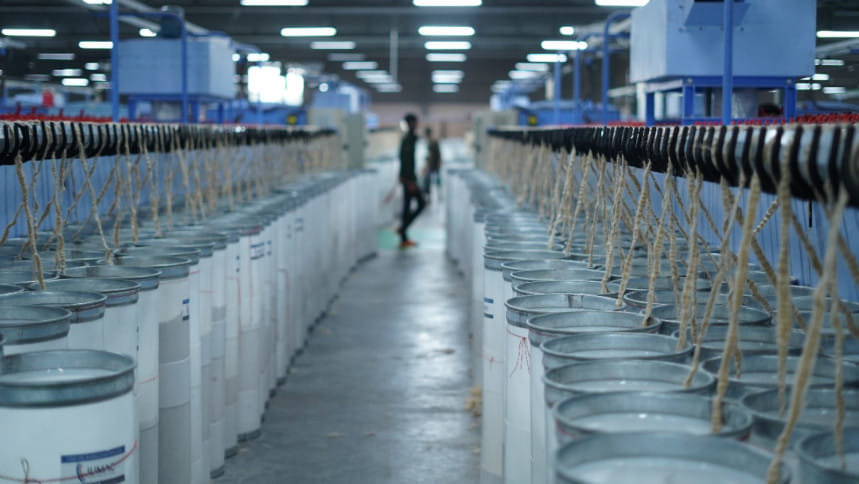Revitalising Bangladesh’s jute industry through pioneering worker training

Bangladesh, historically known as a major player in the global jute industry, has long depended on the "Golden Fibre" as a key economic driver. Yet, in recent years, the sector has faced substantial challenges, ranging from reduced demand for raw jute exports to outdated processing techniques.
Despite being the second-largest producer of jute globally, Bangladesh has struggled to maximise returns from this sector, largely because the focus has remained on exporting raw jute rather than producing higher-value finished goods. This reliance on raw material exports limits the potential for significant economic gains, especially when global demand is shifting towards eco-friendly products.
A pioneering training initiative
A recent collaboration between Swisscontact BYETS project and Akij Bashir Group introduces a new approach aimed at addressing these challenges through targeted skills training. Last year, Akij Bashir Group approached Swisscontact to explore opportunities for training jute industry workers, an area that has seen little to no formal development historically. Recognising the potential impact of such an initiative, particularly given the renewed interest in sustainable materials.
"Through our collaboration with the BYETS project, we aim to revolutionise the jute industry by empowering our workforce with the skills necessary to meet evolving global demands. This initiative not only addresses pressing challenges but also strengthens Bangladesh's position as a global leader in sustainable jute products," said Helal Ahmed, Chief Operating Officer of Akij Bashir Group.
This training programme marks a significant step forward in modernising Bangladesh's jute industry. Until now, no structured training framework existed for this sector, leaving a skills gap that has hindered productivity and quality improvement. This initiative aims to fill that gap by providing workers with hands-on training tailored to the specific needs of jute processing.
Unlike traditional training programmes that focus solely on classroom instruction, this initiative employs a workplace-based training (WBT) model where both classroom based theoretical learning and practical learning is employed. This approach allows participants to learn directly within the factory environment, improving their theoretical understanding of the work process and putting the newly gained knowledge into practical application. To date, two batches have participated in the training at Janata Jute Mills at Ghorashal, Narsingdi, with plans to expand the programme further.
The training initiative comes at a time when the global market is increasingly favouring eco-friendly alternatives, with countries across Europe implementing bans on single-use plastics. Jute, being biodegradable, presents a viable alternative. By investing in workforce development, Bangladesh has the opportunity to reposition itself as a leader in sustainable jute products.
Currently, the country exports jute products to over 135 countries, but the potential remains largely untapped. Improving the skills of workers could shift the industry's focus from low-margin raw jute exports to higher-value finished goods, increasing revenue and fostering economic growth.
Challenges in developing a training module
One of the main challenges of this initiative was the absence of existing training materials specific to the jute industry. While there are established frameworks for sectors like ready-made garments, there was no equivalent for jute. This required BYETS project, SGS, and Akij Bashir Group to collaborate closely in creating a customised training module from scratch. The result is a programme that not only teaches technical skills but also emphasises quality control and efficient production techniques. The training program is being conducted by SGS. The training currently covers Spreader, spinner, rollwinder and breaker machine processes.
The programme's initial focus is on equipping master trainers within the factories themselves, enabling a self-sustaining training system. The long-term goal is to create a continuous learning environment where workers can upskill and re-skill as needed, ensuring that the industry remains competitive.
Looking ahead
The collaboration between BYETS and Akij Bashir Group highlights how partnerships between the private sector and development agencies can drive meaningful change in traditional industries. By focusing on skills development, the initiative addresses one of the key barriers to growth in the jute sector. As the training programme expands, it could serve as a model for other industries in Bangladesh seeking to enhance their competitiveness through workforce development.
The BYETS project is funded by the Embassy of the Kingdom of Netherlands and implemented by Swisscontact

 For all latest news, follow The Daily Star's Google News channel.
For all latest news, follow The Daily Star's Google News channel. 







Comments